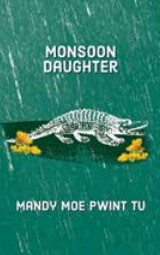After running errands all morning, I collapse with a hundred grocery bags in front of the fridge like one of those deflated wind socks at a car dealership. All I’ve eaten today is coffee. My husband texts me, “Just paid the credit card bill. We didn’t save any money this month because of you.” He’s already done five cases today. I’m throwing out spoiled leftovers, juggling cartons of broth, wondering if I have time to return those silky dresses I bought impulsively when I broke my mom-parole last week. I look around at the kitchen. Soggy Cheerios and Pokemon cards with gnawed corners, junk mail, a blizzard of paper cutouts under stools, stained tulip petals arching their backs in a vase, poised to fall.
I shed my coat, unpeel my scarf like a bandage that’s holding my head in place. I radiate with static electricity and eight years of power-mothering. My whole life feels like static cling. My kids, my husband, the house. I just want to douse it. I want to bathe and wake up new. A Bond babe exiting the ocean. Glistening, refreshed. To need nothing. Just a bikini. My life, reduced to triangles.
Am I invisible if I never talk to anyone? If I go days conversing only with my kids and Debbie at the hardware store? Am I the sum total of my past experiences or the heartbeat of my burning desires? Where do I stuff all the longing?
I catch my reflection in the oven hood. I see a dried artichoke. Or one of those clothing storage bags where you vacuum out the air. I should have done hard labor, something with chemical steam or bamboo hacking, plucking of body hair, chicken sexing, the moving of boulders in a quarry. I’m well-suited for that kind of work. I don’t mind gross, heavy, practically impossible. Meanwhile, the years pile up. I survive on toast nubs and apple skins. I French braid my daughter’s hair with a toothbrush in my mouth and a compost bucket dangling from my wrist. I sit with my kids during every piano lesson. My vagina dries up from underuse. I have this determination, this grit, this maniacal worker-bee mentality. I mean, my kids are worth it for sure, but what’s the point? I must love it, right?
I lie down belly-up on the kitchen floor with an oven mitt over my face. When I close my eyes all I see is a jellyfish. One of those Portuguese Man-o-wars. I see its sail— this turquoise bubble, no bigger than a dumpling in the vast blue. It’s completely weighted down with poisonous ribbons and coils. Half of it lives on the surface, looking at the sky and wanting to be free, the other half submerged in water with these zooids and polyps that feed it and help it reproduce and colonize inside it. It can’t escape, it’s tethered, even though it wants to fly away like a teal balloon.
When I was younger, my parents said I could do anything. Anything.
The beep of the dishwasher snaps life back into focus. I stand up, gather my high voltage hair into a bun to get serious about chores, but hang on a minute, there’s something in my hair, something dry and spongy. What is that? A chunk of hair? I grab hold of it, run to the bathroom mirror. It’s a dreadlock, a mat—like the kind our childhood dog Jake the Newfie would get in the summer, and we’d have to pound at him with a metal rake. All that time he spent under the deck in the dark. Poor mutt actually liked the attention, the cool metal through his fur. I go cross-eyed trying to examine the knot, try to pull it apart like taffy. No way in hell. It’s half my head. It has its own weather system. A thick tornado of hair with a hard, unforgiving lanyard texture that has birthed itself at the base of my scalp. How did this happen?
I jump in the shower with a bottle of Pantene Conditioner and a comb. I rip and tease and brush and pull and tear and slather, but the knot’s not coming loose. In fact, I think it’s getting tighter and closer to my scalp. It’s more than hair at this point. It’s a relentless bundle of needs. It’s a flaxen rope that auto-braided and won’t stop. It’s a bundle of jellyfish tentacles coiling and reaching two hundred feet into the depth of the sea. After twenty minutes I get out, dripping and hunched in the cavern of our bathroom. I google “shaved head haircuts for women.” Smother the knot in coconut oil. Google “How to get a matt out.” Attack it with satay skewers. I break all of them. Google “hair extensions, Philadelphia.” I grab a scissor, poised, ready. Its jaws open wide. Stop. Stop. Wait. Think.
I toss the scissors into the sink with a clatter. Google “therapist on the Main Line, Philadelphia.” Soggy and defeated, I suddenly remember this hairdresser Megan told me about. Kyle. Yes. She has his cell number. Maybe he can help? He can help! He wants a picture. I turn around and take a selfie of my back with the nest of hair. “Help! I’m tangled.”
“Yea sure. Come in Sunday morning. Nice back,” he says. Wink emoji.
I review the picture I sent him. Did I just send a half-nude picture to a stranger? It’s my bare back. I’m horrified. But also delighted? A straight hairdresser? Cha-ching! I always secretly liked my posterior deltoid.
Sunday. I beg my husband to watch the kids even though he’s on call and passive-aggressive-work-texting while I spin around the kitchen like a top wiping down counters. “Our kids can’t have their mom walking around bald, right?” I say to him. “Yea ok, go, but keep your phone on at all times,” he says. “Of course,” I reply. The kids whine, Can we watch TV? They’re heavy breathing and squealing as they build a couch fort with seven hundred blankets.
That’s my cue. I’m so excited to ditch today. I feel like I haven’t left the house alone since my kids were born, plus the Covid years, so basically a decade. Sometimes I can sneak off to CVS alone or get a relaxing bikini wax if my husband is between calls. And while the kids are at school, I can take exercise classes or sub at the elementary school, write a poem between 2pm and 3pm, but other than that, I always have between one and three humans with me. I know what you’re thinking. Get a nanny! A million nannies, right? But I’m a masochist, like I told you. Or I fell so far down a well of homemaking I can’t climb my way out. I’m out of practice. I wear the same shirt three days in a row. I’m what they call “too far gone” or as my husband says, I’m “doing great.” I can’t justify my free-time over mom-time or imagine anyone else driving my daughter to violin, positioning her fingers on the bow, cooking them all dinner, even if it’s eggs. I can’t imagine missing the exchange of all the subtleties of kid-talk at the kitchen counter. I want to take care of them. I love them. I just can’t find anything to grab hold of in this churning ocean (except for wine) and my surgeon husband might as well live on another planet. I step on the gas, blast electronic dance music, and try to become someone cool and relaxed. I pop on my shades and change lanes and change lanes again.
I show up at Kyle’s salon and it’s silent, save for a vague rush of wind. Kyle’s svelte assistant Suki takes my coat. I’m on the twelfth floor of a skyscraper in downtown Philadelphia and everything is sleek and minimal, concrete, white. I hear my own footsteps. The most delicious sound. No one else is here. Did he come in specially for me? I sit in front of the vanity mirror and for some reason the marquee light bulbs around the mirror make even me look gorgeous right now, like I’m the guest of honor at the Great Gatsby’s party and not a housewife from Gladwyne smelling of pancakes. I’m already feeling great about coming. Kyle emerges. “Woah, what did you do?” he chuckles, starts tousling the hair that isn’t a nebula. I feel his fingers on my scalp. My hair in his hands. I go limp, immediately get goosebumps.
“Don’t worry, I’ll get this out.”
“You will?”
“Yea babe, you’re gonna be fine. Lauren? Nice to meet you.”
“You too,” I say.
I silence my phone, take a deep breath, sink into the leather of the chair.
“Lookin’ good mama,” he says, making eye contact with me in the mirror and fastening the cape around me. Is he really talking to me? Babe? Mama? The jellyfish inside me reels something up with a tentacle, drops it down again to dangle. Kyle. His eyes are black and his body movements, so fluid. He’s covered in tattoos, long hair. Something inside me ungulates with a warm current. He’s holding my hair in his hands. He smells like cigarettes, expensive soap, leather. One of the tattoos visible through his ripped v-neck seems to reach for me like a crown of thorns blooming into roses. I’ve completely forgotten about the knot and possible baldness. I’m seeing lightning bolts. I’m imagining his hands all over my body. I’m imagining how we will have to break the news to our families about how we’ve fallen in love and are running off to Bali together. I’m imagining finishing my novel in a bikini with him kissing my bare neck from behind. I’m imagining beads of ocean water on my bare stomach and my life as a perfume ad. He is the opposite of my husband and the suburbs and everything I hate about getting old, used, flattened, forgotten.
“Bourbon?” He asks. You seem tense.”
“This early?” I laugh.
“Why not mama?”
“Ok,” I say, “Sure.” Suki brings it to me. I take a sip and it coats all of my ravines instantly in honey and smoke.
Two hours later. We’ve talked about everything. New York apartments we had, dive bars we got wasted in, leather jackets we loved, bookstores that got bulldozed, how we ended up where we are in life against our will with lots of hand gesturing. Polish poets and borscht in Greenpoint, 917 area codes we’ll take to the grave. That Moroccan club Le Souk on 3rd and B. We miss Barneys, American Apparel, Schillers. We hate bankers, lawyers, doctors, Mormons, cops, Facebook. Life. We miss the Nokia age. We love food. Bloody steaks and strong cocktails. We love sex. We get really worked up and jaded and it feels amazing. His shoes dance around my body like I’m a trophy. His voice is gravel-y and seductive. His hands are fast and strong, his eyes are intense. The little nicks on the inside of his pointer fingers-the unexpected stab of a scissor point-excite me. He picks and pulls my hair with the patience of a monk. The knot is coming loose. It smells like all the coconut.
It’s love at first sight, right? Has to be. I can’t believe how perfect we are for each other. I don’t know how Kyle’s gonna to break it to his gorgeous Italian wife that he is in love with one of his clients and I can’t wait for the sexting to come. What to do about the kids? We’ll have to alternate weekends or… But it doesn’t matter. I’m so exhilarated I start chewing on the ice cubes to calm me down. His apartment probably has a view of the skyline and is dark and chocolatey and he will undress me on his Italian sofa. We will eat brunch lazily all the next day and walk arm in arm and his tattoos and my hair flip will get us into every restaurant and club. This could be good for me. My husband won’t have to know. He won’t even suspect! I’m somehow certain that leading a double life is the answer to my problems. I nurse the fantasy, sucking it up like the last drops of the Bulleit bourbon. The knot is almost loose.
Thirty minutes later, Kyle is done. The knot is out. My heart is cruising down a slip n slide.
“Wow, thank you so much,” I say, and he rips the cape off me like a matador. I stand up, hike up my pants, stretch and arch my spine.
“I’ll check you out over here,” he says. I follow his ass and his Kurt Cobain mane across the room and away to a smoky bar, an exotic island, between my legs— and I decide I’m going to go buy him a present. To thank him. To keep this going. To sting him with one of my Man-o-war tentacles and reduce him to a scaly husk.
“Hey, I need to run to the Chase to grab a better tip for you. Stay here, will you?” I say. I can’t wait to see him waiting for me in one of the spinny chairs. Lit up only by the lights of skyscrapers. Suki will have gone home by then and I’ll have him all to myself.
“Hey, all good Laur, you don’t have to. Next time,” he says with his sultry actor voice. “Or Venmo.”
“No, but I want to Kyle. I’ll be right back. Wait for me, k?” I text my husband: He still needs another hour at least. Sorry. Be home soon.
Twenty minutes later, I pop out of the elevator with gold-dusted rocks glasses in a gift bag and a bottle of bourbon, a blank note. I’m out of breath. I skip towards the salon door and all the pleasure and excitement. I can hear my heart beating. I lick my lips and turn the corner, reach out to delicious diversion. To something outside my boring life, to someone who thinks I’m hot, cool, interesting, worth untangling a hair-knot for with a single-tooth comb for hours, all that stroking and yanking and laughing. Hang on excitement! Here I come life!
The salon is pitch black. Door locked. Very locked.
All I hear is the hum of a distant light bulb, impossible to locate or silence in the vast hallway. My heart sinks into my boots. I think about all the pillow talk. I see myself in the glass. I get a text that my parking is about to expire. The jellyfish sail deflates briefly to dodge a flotilla of water bottles, then back into the ultraviolet and endlessness.
I think about leaving the gift bag at the door with a note. Hey Kyle!— but I don’t have a pen and I. Just can’t. I get it now.
I touch the place where the knot lived. It aches. As if it’s still there and always will be, this thick rope of hair with children and minivans attached to it— my husband, me at the bottom of the well holding them up as I climb, trying to vacuum the well at the same time. I feel its nucleus pulsating, tender at my skull base now. Is it combed out or is it back? Has it entered into my brain vessels now?
What do you want to give the kids for dinner tonight? My husband texts.
I don’t even know anymore I write, then delete.
I look into the dark salon for hidden shapes…a few more seconds…I smell all the exotic products and silkiness. I could bring the booze home? But I don’t really want my husband asking questions about bourbon and fancy glasses, money wasted. I bolt. Press down on the elevator.
Downstairs is a dazed doorman in front of six TV screens. “Here,” I say. “Want this?” I let go of the gift bag into his hands, keep walking.
The glasses rubbing together in the bag is the most embarrassing noise I’ve ever heard.
**
I drive home in the icy slap of winter in Gladwyne, PA. For the first time ever, I wish for traffic, but there is none. I’m home.
I try to come in quietly, but there’s no point. The house is loud and bright, the kitchen full of squeals and spoons clanking, pencils being sharpened. A paper airplane hits me in the head. My husband’s made lentil soup and the kids are slurping it up like cats. The smell of parsley gives me some freshly-hacked hope. The kitchen is a familiar disaster. “Hi Mommy!” everyone says, including my husband. I watch him swirl around a storm of lentils hectically fighting against the current, then dropping to the bottom of the pot. A glass of wine appears.
“How’s your hair babe? You look beautiful,” He ladles me soup, surprisingly chipper.
“My hair is good,” I tell everyone, letting my daughter touch its silkiness with broth hands as I take a seat at the counter and try the soup. My husband gives me a napkin and a kiss, a tiny kiss that’s kind of stupid and tight-lipped like a butthole, but I tell myself it’s a step in the right direction. I think about the stupid bourbon glasses I bought and the conversation with Kyle, the butterflies I felt and get a dreamy and agonized look in my eye while I slurp. My husband smiles at me and I tell him the soup is hot and that’s why I’m tearing up. I let him hug me, look at me, coat me with his gaze. His brown eyes plant roots that reach out through my entire body like firing synapses, blood, sweat and the past ten years. It’s true, he’s an idiot— clueless, messy, self-absorbed—all men are— but his eyes have always leveled me with a single gaze. Maybe I do love him? I could try again? After winter comes spring kinda thing? I take a deep breath, blow the soup, and taste it, letting the fantasy of today trickle down my throat and get absorbed into the mom chronicles. I’ll delete Kyle’s number I tell myself. Tomorrow.
Cassie writes poetry, fiction, and essays. Her work has appeared in Rattle, Cleaver, New Ohio Review, Cagibi, Sad Girls and The Good Life Review, among others. She studies with the poet Phil Schultz at the Writers Studio, based in New York.








